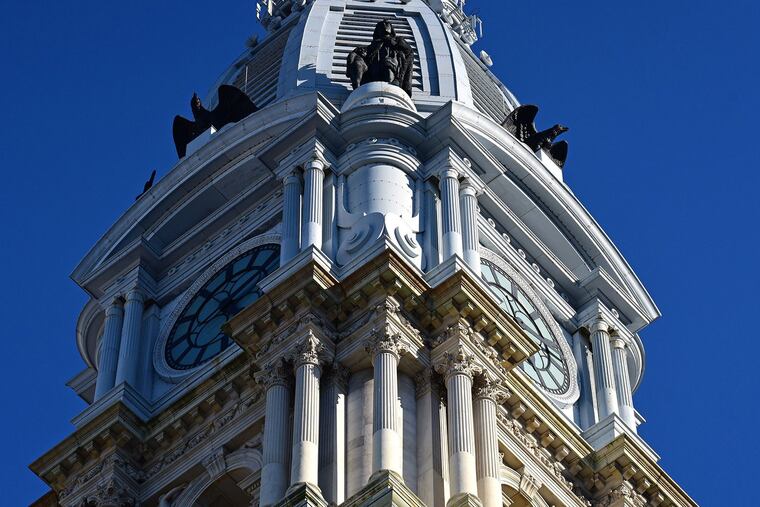‘State of the City’ report reinforces need to address gun violence and joblessness | Editorial
The annual report from the Pew Charitable Trusts doesn’t mean Philly should be feeling a sense of despair. But its negatives point out endemic conditions that should be addressed now, not later.

Too often, Philadelphia looks nothing like a City of Brotherly Love.
It’s hard to be loving when you live in a metropolis that, as the latest assessment by the Pew Charitable Trusts attests, doesn’t always show its residents the love they deserve.
Too many are sick. Too many are poor. Too many are trying to survive in neighborhoods beset by crime and grime.
Change must come. Leadership is needed. Will the city get it?
Pew’s annual State of the City report doesn’t mean Philly should be wringing its hands in despair. But the report’s negatives do point out endemic conditions that should be addressed now, not later.
Without significant improvements in Philadelphia’s quality of life, this city can expect a steady decline from being one of America’s most distinctive communities, a city whose people, neighborhoods, and flavor make it a desirable place to live despite its challenges.
» READ MORE: As Philly’s economy and public health revive, gun violence looms as residents’ chief worry: Pew report
Philadelphia needs to be safer. The Pew report said almost two-thirds of this city’s residents at some point during the previous year heard gunshots in their neighborhoods.
Those gunshots led to most of the 562 homicides that were recorded in Philadelphia 2021. That was a 13% increase above the previous year’s murder tally and marked the first time Philadelphia has had more than 500 murders since 1990, according to the Pew report.
Those gunshots were most common where Black people live, with nearly 4 in 5 of the city’s Black residents saying they heard gunshots compared with less than half of Philadelphia’s white residents.
That startling statistic isn’t about skin color, it’s about the conditions that breed gun violence: poverty, unemployment, and the lack of economic opportunity that is disproportionately seen in too many minority communities.
Philadelphia’s unemployment rate was 8.9% in 2021, which one might think is understandable given COVID-19’s impact on jobs nationwide. But the Pew report points out that the national unemployment rate was 5.3% last year.
» READ MORE: Unemployment was worse in Philadelphia than in many other big cities last year, Pew report shows
Similarly, while both the nation and Philadelphia lost jobs due to COVID in 2020, the percentage of jobs lost here was worse, 8.3% compared with 5.8% nationally.
Give the city credit for climbing out of that valley to achieve a 2.1% increase in jobs last year, but that too was slightly less than the 2.8% increase in jobs nationally.
Clearly, Philadelphia’s economic recovery from COVID must pick up speed, especially in communities mostly of color that were desperate for job-producing investments long before the pandemic struck.
Pew’s timely snapshot of Philadelphia comes on the heels of Mayor Jim Kenney’s proposed $5.6 billion budget for the next fiscal year. Council will now decide whether Kenney’s spending plan is what a city that could use a jolt of energy needs right now.
Kenney’s budget represents a 5.5% increase in overall spending but largely maintains the status quo when you consider inflation and the city’s increased needs
The Police Department will get an additional $23.7 million, boosting its budget to $782 million. An additional $184 million is proposed for antiviolence strategies in targeted neighborhoods, which is a $29 million increase. Public schools will get $269.9 million, a $14 million increase.
What’s missing are new initiatives that would bring real relief to communities that were fighting to pull themselves out of despair before COVID.
Indeed, some of the same issues affecting these same neighborhoods were first noted more than a century ago in W.E.B. Du Bois’ sociological study written for the University of Pennsylvania, The Philadelphia Negro, published in 1899.
His conclusion: That beyond ending racial discrimination, more investment must be made in communities not only in Philadelphia but the rest of America also whose poverty and related crime and other debilities have not been adequately addressed.
“A polite and sympathetic attitude toward these striving thousands; a delicate avoidance of that which wounds and embitters them; a generous granting of opportunity to them; a seconding of their efforts, and a desire to reward honest success — all this, added to proper striving on their part, will go far even in our day toward making all men, white and black, realize what the great founder of the city meant when he named it the City of Brotherly Love,” said Du Bois.
Isn’t it time Philadelphia took his words to heart? If so, let’s get to it.